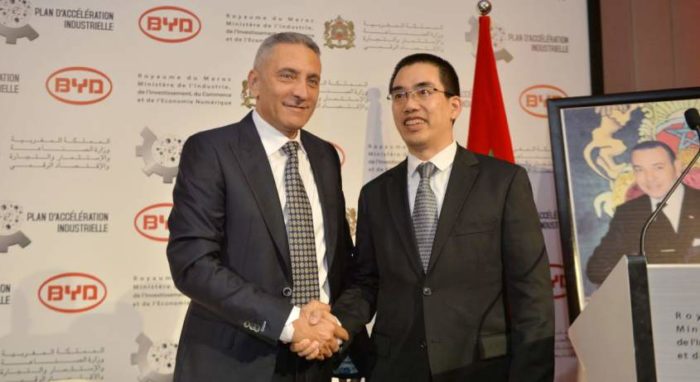Images of the port of Antwerp in Belgium, disgorging thousands of Chinese electric cars, must give European manufacturers pause. The world’s second-largest economy, which has heavily invested in this sector since 2009, is now eyeing the Old Continent after saturating its domestic market. Proof, if any were needed: the upcoming construction of a BYD factory in Szeged, Hungary, the main brand of electric cars in China.
This Chinese awakening also worries America. Tesla, the benchmark for electric vehicles, announced on April 23 that its profits had dropped by 55% between the first quarters of 2023 and 2024. And during the last quarter of 2023, the American giant was momentarily surpassed by BYD.
But while protectionist rhetoric in Europe strengthens and Elon Musk steps up by personally visiting the Middle Kingdom, one conclusion remains: China is successfully making its mark in the electric vehicle sector. The question then arises on this side of the Mediterranean: can Morocco capitalize on the Chinese momentum?
Morocco, a battery paradise?
Rachid Yazami, inventor in 1980 of the graphite anode used today in most batteries powering electronic devices worldwide, firmly believes in Morocco’s potential to establish itself as a player in the global lithium battery industry. Interviewed by Maroc Hebdo in July 2023, he asserts that « Morocco has great potential for battery manufacturing. »
The battery, which « accounts for approximately 35 to 40% of the total cost of an electric car », he notes, is a key sector for automakers. And the kingdom has certain advantages to position itself in this market. Foremost among these is its soil.
Phosphate is essential for manufacturing lithium battery cathodes. With an annual production of nearly 40 million tons per year (in 2022), Rabat is the world’s second-largest producer. Far behind Beijing, certainly, but with much larger reserves than those found in Chinese soil.
Moreover, the physicist notes that Morocco is the third-largest cobalt producer in Africa: a mineral necessary for the production of positive electrodes in batteries. While the kingdom trails far behind the Democratic Republic of Congo, which held a 74% market share in 2023 according to mineralinfo, the presence of these two minerals on its territory makes Morocco, according to Rachid Yazami, a potential player in the automotive battery market.
Finally, the physicist highlights Moroccan industrial expertise. Beyond his contribution to the battery industry in 1980, he developed a rapid charging system that could « fill up » an electric car in less than five minutes. Another positive point, notes the scientist: « the presence of giants in the automotive industry, such as Renault and Stellantis, who will soon transition from thermal to electric vehicles. »
However, two points could jeopardize Chinese manufacturers’ establishment in the Cherifian Kingdom. Lithium, a key component of electric vehicle batteries, is absent from Moroccan soil. Rachid Yazami nevertheless assures that the metal can be easily imported. Finally, China is already the global leader in battery manufacturing, with a well-established supply chain.

An existing partnership, but struggling
While the Middle Kingdom can aim for self-sufficiency in terms of batteries, there is one asset that Morocco can envy: its location. This crossroads between Africa, Europe, and the United States can appeal to the Middle Kingdom thanks to free trade agreements signed with Americans in 2004 and Europeans in 1996.
Evidence of this is the memorandum of understanding signed on December 9, 2017, with BYD, which envisioned the construction, at Tanger Tech, on an area of 123 acres, including 74 covered, of several factories: one producing batteries, another electric buses and trucks, and one for electric monorail cars.
However, six years later, nothing has moved forward. Worse, on April 1 of this year, El Español newspaper claimed that BYD had abandoned the project to establish an electric battery plant. This decision, according to the media, was due to the slow transition of public transport companies to electric buses.
Only ALSA Maroc (a Moroccan subsidiary of a Spanish group) has ordered electric buses. Nevertheless, a source close to the matter, contacted by TelQuel, tempers: « Nothing is confirmed yet, no final decision has been made. »
Furthermore, even if the partnership with BYD were compromised, Morocco can rely on another manufacturer to enter the Chinese market: the lithium-ion battery giant BTR New Material Group. Indeed, a convention was signed on March 29 in Rabat between Aziz Akhannouch and the company.
This partnership worth 3 billion dirhams could allow Morocco to tap into certain markets of the electric automotive industry, with BTR counting BYD, CATL, Volkswagen, and Tesla among its clients. The project, which is currently underway, plans to construct a factory with an annual production capacity of 50,000 tons and is expected to create approximately 2,500 jobs.
Written by Marin Daniel Thézard, edited in English by Eric Nielson



